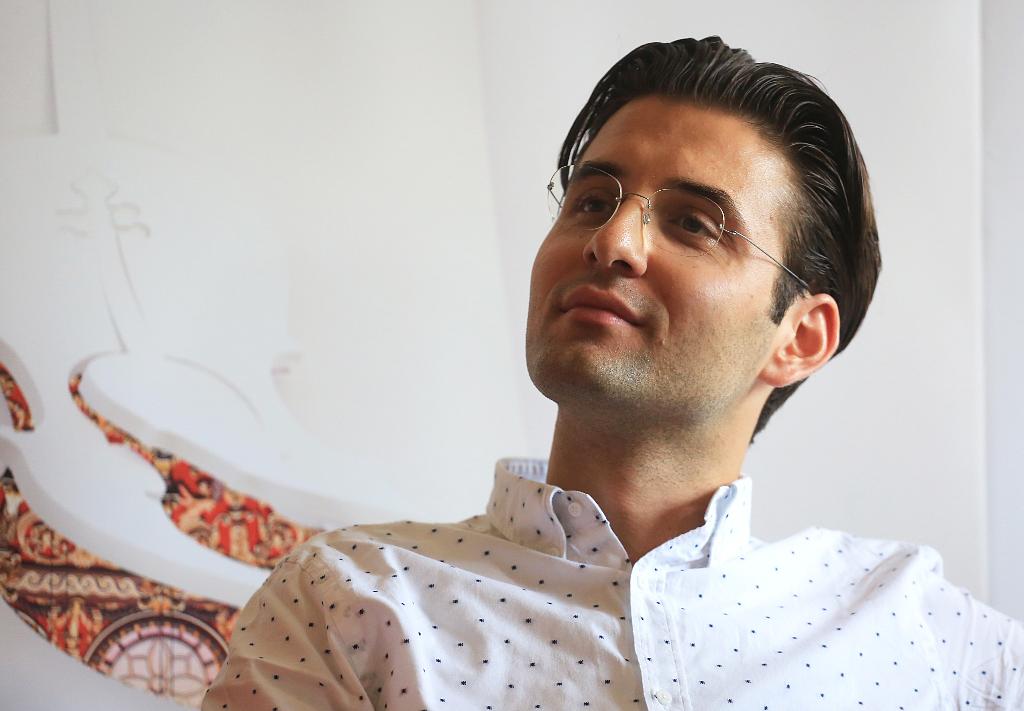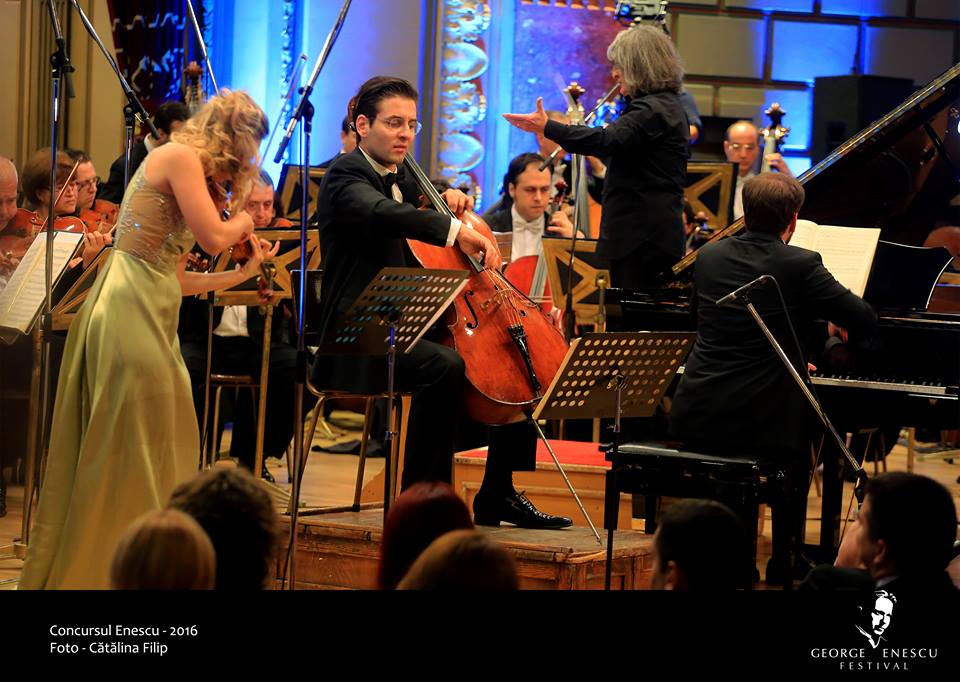From composers to DJs: cellist Valentin Răduțiu on playing Enescu, exploring music styles

After releasing the complete works for cello and piano by George Enescu, and a jazz album last year, cellist Valentin Răduțiu came back this May with a recording with the Münchener Kammerorchester - The Chamber Orchestra of Munich, the city where he was born, to Romanian parents. He was recently in the country to perform in the opening concert of the ongoing Enescu Competition and shared some of his thoughts on the work of the Romanian composer, his music preferences and his early attraction to sound making.
You recorded Enescu, you played Enescu many times in concerts. How did your relationship with his music transformed in time, from a personal point of view and considering the public’s reaction?
I have a very close relationship with Enescu’s music and I don’t feel this with any composer although, every time I am asked about my favorite composer or music, I always say it is the one I’m playing at the time. But with Enescu I indeed feel a connection and, to answer the typical question, if we had a time-travelling machine, I would have liked very much to meet this man, whose music has a message that is more than musical. I find this sensibility, complexity, ambiguity [e.n. to be found in Enescu’s music] absolutely unique, with a vocabulary or an imprint that we immediately identify as being Enescu’s. I also admire him as a person who constantly asked the question of how one should live their life.
Regarding the public, I think also internationally people are starting to realize his value as a composer. I performed his music as much as I could, I incorporated his works in recitals, in concerts in Germany, and I think people can feel how personally valuable this music is to me. And, when it is performed with conviction and with great attention to detail, it touches the public.
Sometimes the “difficulty” of his music is referred to as one reason he is not played more often.
Of course, the concerts field has some effectiveness criteria. And this is a music, especially the later Enescu, of a certain complexity. Any musician who has prepared for the first time the Piano Quartet No. 2 by Enescu can confirm it takes a greater effort to learn it, to penetrate this music, to understand it and be able to perform it with freedom. Of course, we anyway have this dangerous tendency of performing like a DJ, the “best-ofs”, to always perform the Tchaikovsky concert and Beethoven’s fifth symphony and so on. But in this panic let’s say, where classical music sees itself confronted with, in between quotes, the danger of the internet, people no longer coming to concerts, one solution would be to always play hits. And it is not like this. The public can be very happy to not hear for the seventeenth time the second piano concerto by Brahms and this effort to learn the music, yes, can be noticed when listening to it. It is not a prototypical music which can turn into a tune you can whistle right away. But this is its beauty. […]. And maybe it is a music which needs to be listened several times to be able to understand this language, just as we cannot understand Chinese the first time we hear it. Still, I remain convinced that there is a universality at its emotional core which is open to any listener.
If you were to recommend several Enescu works to someone looking to get acquainted with the composer, what would those be?
They could listen to the Violin Sonata No.2, to listen anyway more than just the First Romanian Rhapsody. Or to have the courage to listen maybe to the Fourth Symphony, to truly discover this universe starting with his earlier works until maybe they have the patience and can undertake the mental and emotional effort to listen to a piece like Oedip, for instance.
What are you working on at the moment?
I have several discs published. I have just launched a disc with the Munchener Kammerorchester, with three cello concertos. Also ‘in the oven’ is the next disc probably, which will be a chamber music one with piano player Evgeni Bozhanov, with works by Rachmaninoff and Tchaikovsky.
You previously said that “Every stage is a good teacher.” Would you say there is something you learned playing in Germany, something else playing in Romania or elsewhere?
I don’t want to categorize. The idea is in the abstract sense, in the sense that you can learn everywhere. I said this at a concert that I thought was at the margin of a country, where unexpectedly there was a surprisingly modern and large concert hall. As a travelling musician you get to unexpected places all the time because the life of a musician is not only Berlin or Paris or Bucharest. So one can learn everywhere. I remember an example of how Rostropovich played the Dvořák concerto several times in his life from the platform of a truck and accompanied by an accordion; this is how one learns, by playing.
How do you view the role of music education?
I don’t think it is about seeing musical training as something for musicians. Neurologists confirm what an important effect music has over the brain. At the same time, it is about us as people, as a society, what we give ourselves as content and how music can be with us for a lifetime. I like listening to various music styles but I don’t know if a Jay Z song which I might have enjoyed at a party will tell me something when I’m 80, if I will reach that age. Or at the end of life, when one won’t have many friends and music is that friend. We need to realize that it needs to have a natural, essential part in school, in training. […]. And getting a child to value something intangible is essential.
Who are some of the musicians you admire?
Of course, all of my professors, from whom I have learned a lot. Likewise, the musicians with whom I collaborated. I think I had a lot of support from my parents, of course, during college. A man needs to surround himself with people who are better than him. We can think of Steve Jobs’s saying that A people hire A people, B people hire C people. And I had this luck as a young person to be closer to more experienced people and this is the most fantastic thing, to have the opportunity to learn, both as a child and as an adult.
Could you give us some names?
If we are talking about my professors, in the order they entered my life, after my father, I was the student of Clemens Hagen, the cellist in the famous Hagen Quartet, who during the sensitive time of puberty showed me a path and an essential instrumental direction. Then Heinrich Schiff, he is an idol of mine, a former professor and David Geringas, who is now in the jury of the Enescu Competition.
I admire musicians all the time. As I said, every stage is a teacher, and every musician can teach us something.
What music do you listen to in your free time?
I listen to more than classical music.
I like jazz very much. Sometimes I need a non-sentimental music, one whose sole purpose is entertainment.
I was mentioning hip-hop before because classical music has a depth that brings me personally, and I think many others as well, closer to myself in a way that can be consuming or can leave one pensive. Anyway, we need to also think of Schiller who tells us that “Ernst ist das Leben, heiter ist die Kunst (Life is serious, art serene)”.
Is there a story to the instrument you are playing?
As a story to illustrate its age, when I play the Cello Sonata No. 2 in F major by Brahms I sometimes tell the public that he composed this work in 1886, two centuries earlier Francesco Ruggieri made this cello in Cremona in 1686, and a hundred years after Brahms composed this sonata I was born. So a total of 330 years have passed since this cello was made. With this instrument, if people take care of it, if I take care of it, it lives longer than the performers.
Is there any other instrument you would like to play?
I love the piano very much, and it is the jazz passion of mine where I have fun with this instrument. Ever since I was a child I have been greatly attracted to anything making sound. I terrorized my parents with the Blockflöte, the recorder, and when someone showed me for the first time how I could whistle with my hands I spent hours to learn how to do it. And this is music actually, any instrument you can express yourself with. But I truly love the cello, it is a part of me, I feel a shared part with it.
Do you have a favorite spot in Romania?
I’ve been coming here more and more often these past years; I come during the summer for the holidays. My parents are from Cluj and I spent many summers in Bălcesti. I think my world in Romania is firstly there, in the mountains. There are of course the cities I played in but I would say that it is there where my nest in Romania is.
Photo: Cătălina Filip
Valentin Răduțiu - CV Highlights

Valentin Răduțiu was born in Munich and received his first cello lessons from his father at the age of six. He later studied in Salzburg, Vienna and Berlin with Clemens Hagen, Heinrich Schiff and David Geringas.
He was awarded at national and international competitions, including the “Jugend musiziert” competition, the Dotzauer Competition in Dresden, the International Karl Davidov Competition in Riga and the George Enescu Competition.
He has performed with the Deutsches Symphonie-Orchester Berlin, the Deutsche Radiophilharmonie Saarbrücken, the Symphonieorchester of the MDR Leipzig and the SWR Stuttgart, Münchener Kammerorchester, Camerata Salzburg, Bucharest’s Enescu Philharmonic and the Radio-Symphony-Orchestra, the Latvian National Symphony Orchestra, Hong Kong Sinfonietta, Südwestdeutsches Kammerorchester Pforzheim, Prague Philharmonia, Stuttgarter Kammerorchester and the World Youth Symphony Orchestra and has appeared at the Berliner Philharmonie, Munich’s Prinzregententheater, Philharmonie and Herkulessaal, the Konzerthaus Berlin, Philharmonic Hall Riga, Konserthuset Stockholm, Bucharest Atheneum, Hong Kong City Hall, as well as numerous festivals (including the Schleswig-Holstein Musik Festival, Heidelberger Frühling, Cellobiennale Amsterdam, Honk Kong Arts Festival, SoNoRo, Fürstensaal Classix, Klangspuren Tirol).
His recordings include: the 2011 debut CD with works by Schumann, Franck, Ruzicka and Saint- Saëns; the 2012 Lalo, Ravel and Magnard: Cello Sonatas; the 2014 Complete Works for Cello and Piano by George Enescu, alongside Per Rundberg. The CD included the world premiere recording of Enescu’s sonata movement Allegro in F minor; the 2015 album “Remembering the Rain” recorded with jazz pianist Benjamin Schaefer; and the 2016 “Haydn: Cello Concerto” with the Munchener Kammerorchester.
You can find some of his albums at the Humanitas Kretzulescu bookstore in Bucharest or online.












